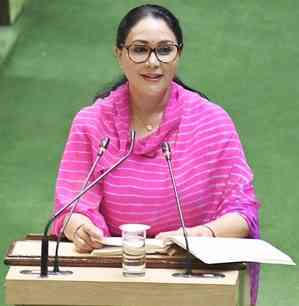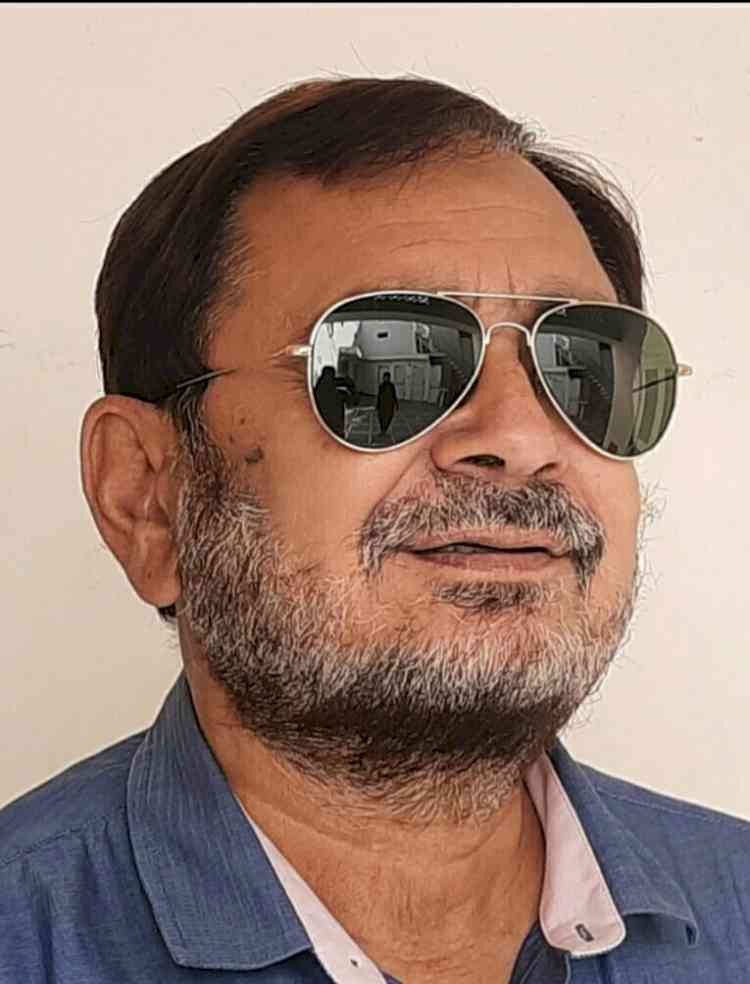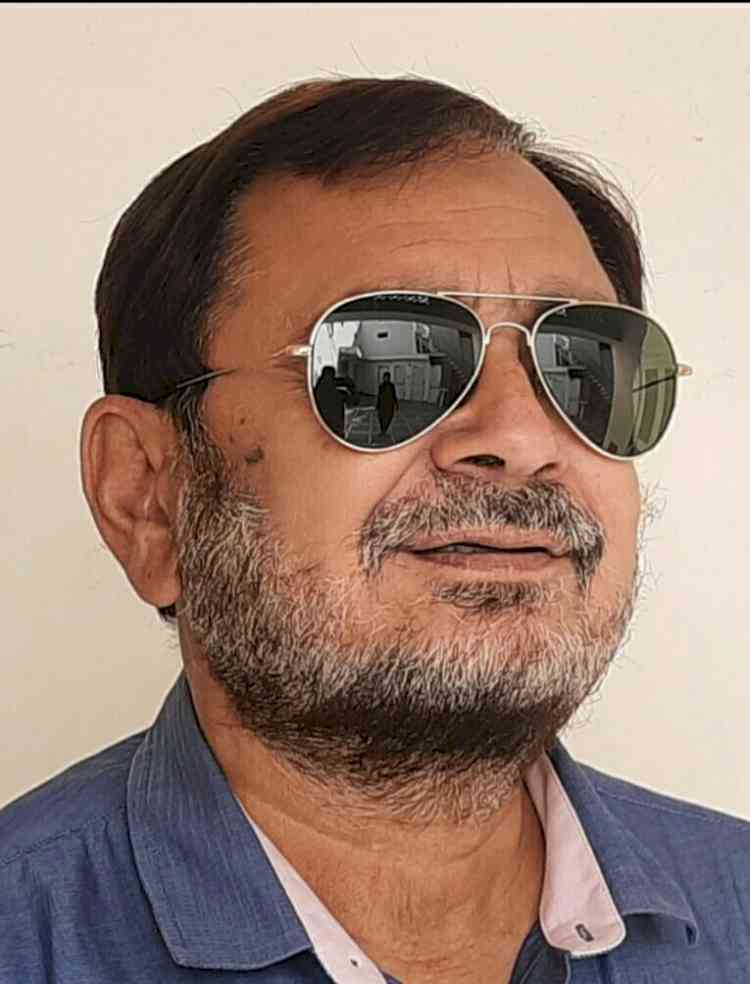Employment generation, data centres, petro zone focus zones, says Raj Deputy CM
Rajasthan Deputy Chief Minister and Finance Minister Diya Kumari on Saturday said that her government has proposed the establishment of a Data Center Policy which is a ‘sunrise’ sector.

Jaipur, July 13 (IANS) Rajasthan Deputy Chief Minister and Finance Minister Diya Kumari on Saturday said that her government has proposed the establishment of a Data Center Policy which is a ‘sunrise’ sector.
She added that the Rajasthan Petro Zone announced in the Budget aims to provide integrated development of allied industries.
“Our new Industrial Policy 2024 will focus on ‘Ease of Doing Business’ and ‘sustainability’,’ the Deputy Chief Minister said.
She said that tourism, arts and culture promotion is part of the state government’s ten resolutions with the aim of ‘Viksit Rajasthan 2047’, adding, that developing Rajasthan as a wedding destination and developing lesser-known sites for tourists will be the government’s main focus.
Interview excerpts:
IANS: Your government’s Budget has set a target of ‘Developed Rajasthan 2047’. However, the state stands second on the unemployment index. How would you address the unemployment issue?
Diya Kumari: We are determined to provide the youth with employment according to their capabilities and build their capacity further. We have promised four lakh jobs in the government sector for the next five years. For the current year, we have raised one lakh jobs. Through skill development, we aim to provide another six lakh jobs. We have also provisioned AI-based counselling services, apprenticeship-internship programs and exposure visits for the youth to other states and abroad in this Budget. We are bringing the ‘State Skill Policy’ in order to update the curriculum in the various streams in the state. Under the ‘Atal Entrepreneurship Program’, CEOs of various national and international companies will act as mentors for the youth. We have announced a Rs 100 crore fund for providing financial support to start-ups through equity funding. We have also announced AVGC-XR (Animation, Visual Effect, Gaming, Comics – Extended Reality) Policy, which aims to provide 50,000 jobs in the next five years for the youth. For the skill development, we have started the Learn, Earn, and Program (LEAP) program.
We are pushing job-centric policies with an eye towards emerging sectors where youth may upgrade their skills and make their career in both government and private sector and even become job-provider instead of job-seekers.
IANS: Your government has announced nine green expressways and roads for 53,000 km. Is there any deadline being set to ensure timely completion of work?
Diya Kumari: Prime Minister Narendra Modi has a policy that whichever project he lays the foundation, would be inaugurated by him only. We will also follow PM Modi’s footsteps and complete all projects in a time-bound manner. We will give our cent per cent efforts to realise that all these projects get completed on time. We have set aside a Budget of Rs 9,000 crore for the development, upgradation and repair work of bypass roads, elevated roads, flyovers, ROBs, RUBs, and high-level bridges. Our 9 Greenfield Expressway, measuring 2750 kms, will prove to be a paradigm shift in the road infrastructure and connectivity in the state. We have set aside Rs 30 crore for preparing the Detailed Project Report (DPR) of these projects.
IANS: What is Rajasthan Petro Zone in Balotra. It is said that this project will develop Rajasthan immensely.
Diya Kumari: Rajasthan Petro Zone announced in the Budget aims to provide integrated development of allied industries which focus on the downstream products from the oil exploration in the area. This planned development will also attract investment, and create business opportunities and jobs for the local youth. It will also generate a revenue stream which will be used for the welfare of the downtrodden.
IANS: Your government has announced specific policies for every sector. Has the government planned how to implement these policies on the ground?
Diya Kumari: Our new Industrial Policy 2024 will focus on ‘Ease of Doing Business’ and ‘sustainability’. The policy will include the development of ‘theme-based’ industrial parks with a focus on Research and Development (R&D) and the promotion of Green Technology. We are also coming up with the MSME policy, Export Promotion Policy, Garment and Apparel Policy, Rajasthan Warehouse and Logistic Policy, and most importantly Data Center Policy – which is a ‘sunrise’ sector. We have also announced to set up India’s first Data Exchange – Raj D.Ex.
The new policies provide the hassle-free layout of the sectoral development and are up-to-date in the changing ecosystem of the business environment. Thus, it ensures that there are no policy pitfalls for investors and businesses. Ease of Doing Business and sustainability remain the keywords for us to focus on.
IANS: Huge funds were sanctioned for the tourism sector under the previous government which were left unused. Your government has also sanctioned huge funds for the sector. Are there any proper plans to ensure that these funds don’t lapse again?
Diya Kumari: The contribution of tourism to our GSDP is 5.6 per cent and around 20 lakh families are directly or indirectly dependent on the sector. It was a mistake on the part of the previous government not to utilise the funds. Tourism, arts and culture promotion is part of our ten resolutions with the aim of ‘Viksit Rajasthan 2047’. So, tourism is our focus area for the next five years. We have set aside Rs 5,000 crore to develop heritage, religious, rural, adventure and eco-tourism. I have also announced a new Rajasthan Tourism Development Board which will use these funds through the Rajasthan Tourism Infrastructure and Capacity Building Fund (RTICF). We have also created the Rajasthan Heritage Conservation and Development Authority and have set aside Rs 100 crore for the Jaipur Walled City Heritage Development Plan for the UNESCO World Heritage City. Developing Rajasthan as a wedding destination and developing lesser-known sites for tourists will be our focus.
IANS: Your government has announced the Green Budget from the next year. What is this concept?
Diya Kumari: The Central government is pursuing the policy of ‘Green Growth’. We are also promoting the theme through the use of EV buses, non-use of plastic, and the promotion of solar energy, etc. Green technology and sustainability are the keywords of our Budget. We are introducing policies which focus on increasing the use of ‘Green and Sustainable’ technology. We are also establishing a Forest Carbon Credit Certification Mechanism. It will provide the policy framework and encourage businesses and people to invest in green technology. This will lay the foundation for the Green Budget next year, which will be to promote sustainable technologies in various sectors.
IANS: The amnesty scheme in different areas has been announced. What does it aim for?
Diya Kumari: Amnesty schemes are an effort to encourage defaulters to clear their dues. Various amenity schemes have been announced with the view of increasing the revenue which was not recoverable, so far.
IANS: Rajasthan is under huge debt. What are the revenue streams set in the Budget which can help the state to come out of the debt?
Diya Kumari: Yes, there are legacy issues. However, our government will find a way to overcome these. The state’s revenue deficit this year would be 1.45 per cent of the GSDP and the fiscal deficit is expected to be 3.93 per cent which would be under the prescribed FRBM limits. We would be saving Rs 150 crore through better management of the resources in this Budget. We are focusing on the operational efficiency as well. We are also focusing on efficient resource mobilisation through alternative or innovative financing. In the health sector, RajMES, RMSCL, etc. are leveraging their resources. In the water sector, ERCP Corp and RWSSC’s operation and maintenance (O&M) will be shifted to Special Purpose Vehicles (SPVs) in a time-bound manner. We are determined to work with a futuristic approach focusing on alternative funding mechanisms in order to deliver effective and efficient delivery of public services.
--IANS
arc/dan


 IANS
IANS 








